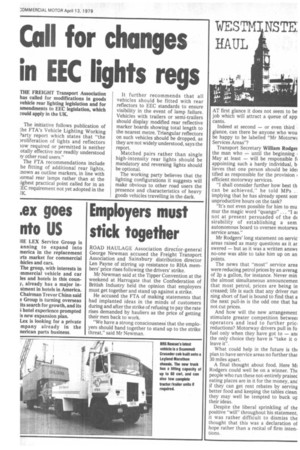Employers must stick together
Page 7

If you've noticed an error in this article please click here to report it so we can fix it.
ROAD HAULAGE Association direcior-general George Newman accused the Freight Transport Association and Sainsbury distribution director Len Payne of stirring up resistance to RHA members' price rises following the drivers' strike.
Mr Newman said at the Tipper Convention at the weekend at Harrogate that the Confederation of British Industry held the opinion that employers must get together and stand up against a strike.
He accused the FTA of making statements that had implanted ideas in the minds of customers during and after the strike of refusing to pay the rate rises demanded by hauliers as the price of getting their men back to work.
"We have a strong consciousness that the employers should band together to stand up to the strike threat," said Mr Newman. AT first glance it does not seem to be job which will attract a queue of app cants.
Indeed at second — or even third • glance, can there be anyone who wou be happy to be labelled "Mr Motorwi Services Areas"?
Transport Secretary William Rodgd the man who — until the beginning May at least — will be responsible f4 appointing such a hardy individual, b lieves that one person should be idei tified as responsible for the provision efficient motorway services.
"I shall consider further how best th can be achieved," he told MPs . implying that he has already spent so unproductive hours on the task?
"It's not even possible for him to mu mur the magic word "quango" ... "I ai not at present persuaded of the d( sirability of establishing a sem autonomous board to oversee motorwa service areas."
Mr Rodgers' long statement on servic areas raised as many questions as it ar swered — but as it was a written answe no-one was able to take him up on an points.
The news that "most" service area were reducing petrol prices by an averag of 2p a gallon, for instance. Never min the almost simultaneous announcemen that most petrol, prices are being in creased; life is such that any driver run ning short of fuel is bound to find that a the next pull-in is the odd one that ha not cut prices.
And how will the new arrangement stimulate greater competition betweei operators and lead to further prici reductions? Motorway drivers pull in fo fuel only when they have got to — an the only choice they have is "take it o leave it".
What could help in the future is th■ plan to have service areas no further thar 30 miles apart.
A final thought about food. Here MI Rodgers could well be on a winner. Th( people who run these not-entirely praisec eating places are in it for the money, anc if they can get rent rebates by serving better food and keeping the tables clean they may well be tempted to buck up their ideas.
Despite the liberal sprinkling of the positive "will" throughout his statement, it was rather difficult to dismiss the thought that this was a declaration of hope rather than a recital of firm intentions.
















































































































